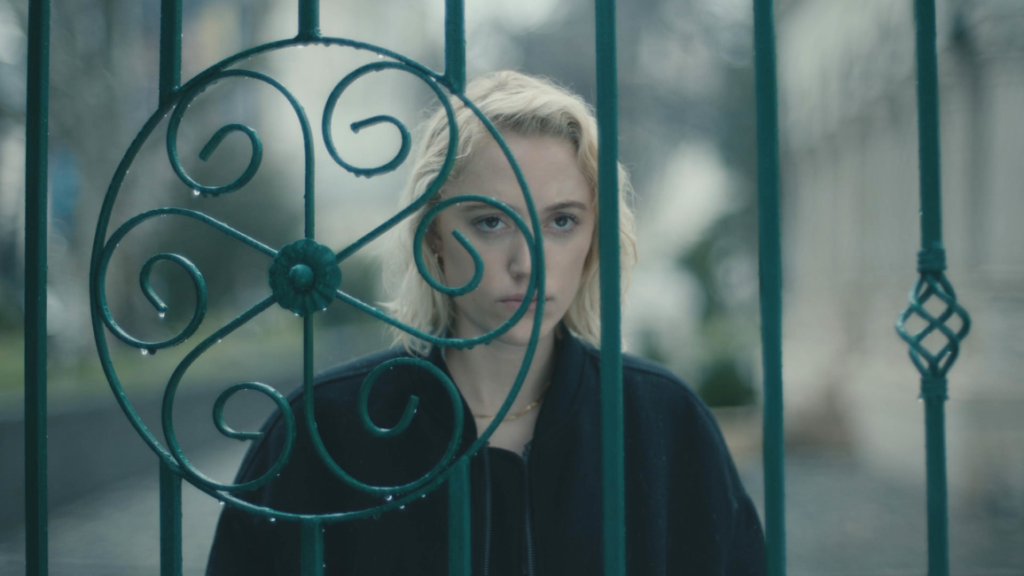Watcher stumbles into the territory of predictability that has sunk many a better horror-thriller before it.
Horror inspired by the unique voyeurism of apartment-living and being a stranger in a strange land is nothing new, and with Watcher, director Chloe Okuno attempts to pull these well-worn tropes into the 21st century. The story follows Julia (It Follows star Maika Monroe), an idle middle-class wife transplanted into Romania, a country where she has nothing to occupy her time and does not speak the language. In the face of all this boredom and loneliness, Julia develops an obsession with a man in the neighboring apartment building (Burn Gorman), who she believes is watching and stalking her. Becoming increasingly concerned for her own life and convinced that the man is a serial killer, Julia begins stalking him across the streets of Bucharest in return. Instead of relying on any digital gimmicks or commentary on surveillance culture, Okuno keeps things simple, constructing a relatively simple cat-and-mouse dynamic between Monroe and Gorman.
Drawing on aesthetic and thematic predecessors like Rear Window and Rosemary’s Baby for some of its character dynamics — specifically the voyeurism of the former and the character types of the latter — Watcher is certainly a film that is aware of its own ancestry. However, for all that understanding, and Okuno’s confidence in incorporating successful elements of recognizable films, Watcher ends up a pale imitation, unable to bring any necessary originality to a film niche with such big shoes to fill. While Watcher largely succeeds according to its technical craft, with evocative cinematography and remarkable performances from both Monroe and Gorman, the script simply doesn’t drive the film in any particular direction, its lack of anchor leaving it to feel entirely shallow. Still, that’s not to say it’s devoid of potential — Okuno does hit on some particularly interesting subtext. There’s the implication of the film’s title, which suggests Julia’s role as watcher and the ways in which this might empower the object of voyeurism by flipping the power dynamic on its head. And then there’s the (all-too-brief) study of Julia’s own power in the situation, hitting on both contemporary considerations — an affluent white woman whose tears could lead to lasting consequences for those she accuses — and more classical ones — a working-class man who feigns innocence by leaning into interpretations of Julia as a hysterical woman. Throughout, such appealing discursive tendrils creep at the edge of the script, but they are never explored enough to fully elevate the film from retread status.
But in fairness to the genre, we understand that thematic weaknesses can sometimes be forgiven if the work accomplishes the simple job of all horror films: is it scary? Despite a few choice moments that draw on the everyday, specifically gendered fears of being alone with a threatening man with no resource or help — such as in a climactic scene where Monroe and Gorman are alone together on a stalled underground train — Watcher is disappointingly void of much tension. Part of this is again thanks to deficiencies in the script, which feels too rooted in familiar, formulaic territory to unsettle much, but it’s perhaps in greater part due to the double-edged sword of Gorman’s casting. The actor is no doubt chilling as the watcher, at once sinister and disarming, a figure who evokes fear even in silhouette. But the role comes at but the latest in a long run of nasty roles for Gorman, from a Nazi bomber in Imperium to a rapist-murderer in Game of Thrones and a homophobic dirty cop in And Then There Were None, to name just a few. Sticking to such typecasting means even the more deceptive, cunning elements of Gorman’s performance, intended to put the audience at odds with Julia’s perspective, are nullified. From his first moments on screen, it’s hard to envision Gorman as anything other than what Julia perceives him to be — a vile, violent figure — and without any aid from the script, Watcher is left to anticlimactically stumble into becoming the worst thing a horror-thriller can be: predictable.
Originally published as part of Sundance Film Festival 2022 — Dispatch 2.


Comments are closed.